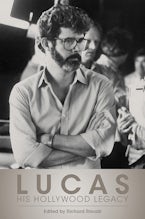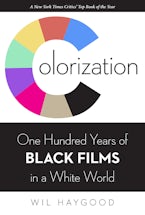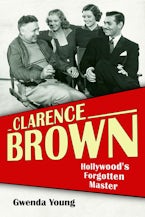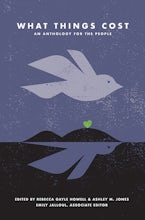- Home
- media studies
- War & Homecoming
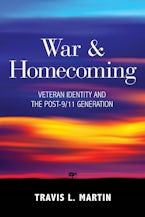
War & Homecoming
Veteran Identity and the Post-9/11 Generation
by Travis L. Martin
Published by: The University Press of Kentucky
Imprint: The University Press of Kentucky
Sales Date: 07/26/2022
204 Pages, 6.00 x 9.00 in, 6 b&w illustrations
Other Retailers:
In War & Homecoming: Veteran Identity and the Post-9/11 Generation, Travis L. Martin explores how a new generation of veterans is redefining what it means to come home. More than 2.7 million veterans served in Iraq and Afghanistan. Their homecomings didn't include parades or national celebrations. Instead, when the last US troops left Afghanistan, American veterans raised millions of dollars for the evacuation of Afghan refugees, especially those who'd served alongside them. This brand of selflessness is one reason civilians regard veterans with reverence and pride.
The phrase "thank you for your service" is ubiquitous. Yet, one in ten post-9/11 veterans struggles with substance abuse. Fifteen to twenty veterans die by suicide every day. Veterans aged eighteen to thirty-four die at the highest rates, leading advocates to focus on concepts like moral injury and collective belonging when addressing psychic wounds. Martin argues that many veterans struggle due to decades of stereotyping and a lack of healthy models of veteran identity. In the American unconscious, veterans are treated as either the superficially praised "hero" or the victimized "wounded warrior," forever defined by past accomplishments. They are often appropriated as symbols in competing narratives of national identity. War & Homecoming critically examines representations of veterans in patriotic rhetoric, popular media, literature, and the lives of those who served. From this analysis, a new veteran identity emerges—veterans as storytellers who reject stereotypes, claim their symbolic authority, and define themselves through literature, art, and service. Their dynamic approach to life after military service allows for continued growth, agency, individuality, and inspiring examples of resilience for others.
Preface
Introduction: Post-9/11 Veterans in the American Unconscious
1. A Theory of Veteran Identity
2. Our Nation's Heroes
3. Our Wounded Warriors
4. The Veteran Storytellers
Epilogue: The Rise of Veterans Studies
Travis L. Martin is founding director of the Kentucky Center for Veterans Studies at Eastern Kentucky University. He has established several nationally recognized programs to support returning veterans in higher education and the nonprofit sector. A scholar of American literature, psychoanalytic trauma theory, and social theory, Martin presents frequently at conferences and universities. He has published dozens of research articles and creative short works on veterans' issues. As a sergeant in the US Army, he served during two deployments in the Iraq War (2003–2004 and 2005).
This book helps capture the Veteran phenomenon as none other. The dilemma of having earned an identity and simultaneously losing the privilege to decide when it is used to define who you are, forces Veterans into a constant struggle between positive and negative stereotypes. In the current national zeitgeist where one's identity can create cascading effects, do diversity, equity, and inclusion initiatives adequately take Veterans into account? Calling out the actual damage done by labeling all Veterans as heroes or wounded warriors, Dr. Martin helps to lay the foundation for the important work that lies ahead with so many transitioning Veterans.
~LTC (R) Nick Swayne, PhD, Founder, JMU X-Labs
'Homecoming is not an experience. It is a lifelong process.' Travis Martin has written one of the most important non-fiction books for and about American veterans of the last 20 years – the years of the 'forever war.' His writing should be on the same shelf as Karl Marlantes, Sebastian Junger, Kayla Williams, and Johnathan Shay. His ideas about Veteran Identify provide the history, structure, and theoretical depth for veterans and non-veterans to understand more deeply and think more critically about this important piece of American society. Travis Martin's prescription is not new, but it has been lost to a society that is moving too fast and connecting too superficially to remember — veteran testimony is the key. Veterans telling their stories through fiction or non-fiction, in conversation or action, or whatever form fits the person and the context will inevitably make the veteran experience more accessible to all. Finally, the description of Dr. Martin's work in the academic field of Veterans Studies provides a template for the expansion of this important discipline beyond the niche and into the mainstream.
~Lt. Col (Ret.) Jim Craig, Chair of Sociology and Coordinator of Veterans Studies at the University of Missouri-St. Louis
Travis Martin tackles the matter of what it means to be a veteran and what the nation is actually obligated to understand about the citizens it so often cavalierly sends off to war. This book builds upon a foundation of wide and serious reading, conscientious interaction with vets, deep thought, and personal experience. If there is hope for the fruitful and nourishing integration back into society after war, it lies in, as Martin strenuously and healthily points out, in storytelling and the arts. The human race needs stories. We need all the experience we can get.
~Donald Anderson, editor of War, Literature, & the Arts
How do we serve as sounding boards for veterans who are redefining self after military service? What does storytelling contribute to self-definition, what is veteran impression management, and how do veterans exercise rights to manage their identities? How does post 9/11 therapeutic culture create traumatic assumptions about veterans? Travis Martin explores these and other questions about the theory of veteran identity, veteran symbolic authority, and patchwork identity in what will surely be required reading in the emerging field of Veteran Studies about the post 9/11 generation. Tracing the tropes of sacrificing heroes, heroic moments, and woundedness through novels, poetry, film, and congressional medal narratives, Martin offers a lens on the role of the arts to upack notions of military masculinity and gender performances that will do much to subvert stereotypes and influence a more meaningful, collective, and nuanced homecoming process.
~Nancy L. Dallett, Advisory Board member for the Veterans Studies Association and Associate Director for the Office for Veteran and Military Academic Engagement at Arizona State University
'Veteran identity,' the 'homecoming process,' 'heroism,' and 'wounded warrior stereotypes,' are dynamic and interrelated topics that have perplexed scholars and professionals for generations. Few individuals have the requisite knowledge, experience, and skillset necessary to adequately address such topics, at least from an insider's perspective. During the post 9/11 era, which coincided with incredible advancements in information technology and social media, the topics mentioned above continued to evolve as social constructs and are now more complex and elusive than ever. As a former soldier, leader, combat veteran, professor, and scholar, Dr. Travis Martin is uniquely qualified to delve into the perplexing topics featured in his authoritative book. His provocative and insightful work is of tremendous value, not only to veterans, but to educators, health care professionals, employers, and family members who are engaged in supporting veterans during the homecoming process. Travis Martin writes with passion and purpose, and I salute him for his service, candor, and continuing advocacy for our veterans.
~Colonel (Ret.) Eugene J. Palka, PhD, Department of Physics, Geosciences & Astronomy at Eastern Kentucky University
Through personal experience and scholarship, Martin provides insight into the complexity of veteran identity. When people picture military veterans, narrow representations often come to mind - heroes, victims. Martin helps readers understand the depth of veterans' experiences, and the role of personal, social, and cultural factors that inform veteran identity. Martin also underscores the importance of veteran identity in shaping how veterans and the public engage with one another. The writing is vigorous, the stories illuminating.
~Scott Parrott, associate professor of journalism at the University of Alabama and director of the Veterans & Media Lab
A must-read for anyone who wants to understand personal civil-military relations as seen through the eyes of a veteran.
~Brigadier General Jim Iacocca, US Army (Ret.)
War and Homecoming: Veteran Identity and the Post-9/11 Generation is a much needed reflection on what it is to be a veteran after 20 years of war. Driven by personal experiences and shaped by scholarship, the book seriously considers the shifting identities of individuals and the complexities of social living. It is accessible while also providing insight. Any conversation about US veterans would be well informed by this work.
~Steven Wahle, LCSW, University of South Carolina
Travis Martin has created an essential work for all interested in understanding post-service life and how military experiences shape perceptions and life trajectories. There are no other works that combine first-hand experiences, literature, and scholarly knowledge. While War and Homecoming is written from a post 9/11 veteran angle, what is uncovered is timeless. Scholars, veteran-facing workers, servants of the public, and informed citizens should start their journey into the vastness of veteran life with this work.
~Dr. Ernest "Luke" McClees, cofounder of the nation's first Bachelor's program in Veterans Studies at Saint Leo University
Dr. Travis L. Martin's examination of the theory and reality of veteran identity has broadened, and in some respects begun, a national conversation about what it means and doesn't mean to be a veteran. His multidisciplinary analysis of the topic peels back entrenched layers of rhetoric to examine the core of a widely misunderstood group of people, and incorporation of his personal experience lends the work an emotional weight that renders abstract concepts in readily approachable, tangible, deeply powerful forms. The resultant book upends prevailing definitions of veterans, introduces new modes of thinking about them, and, above all, challenges audiences to recognize the individuality of each of the eighteen million veterans in the United States.
~David P. Ervin, Editor-in-Chief of Military Experience and the Arts
Travis Martin excels in assessing the journey veterans face transitioning from active service, including combat and other stressful assignments, to the homefront, with the associated challenges of adapting to community expectations – and the community's adaption to them – in their new role as veterans. It's not an easy transition, for either the veteran or the community. The expectations of both inflict stress, as the veteran strives for a purposeful individual identity while the community categorizes them as 'different' due to their unique experiences. Dr. Martin provides an invaluable service by taking us into the world of veterans and their experiences – how veterans experience military service in their individual, uniquely different ways under the broader context of military service; how they are perceived by both themselves and their community; and the challenges and opportunities created by the transition back into society. As a veteran of multiple combat-related deployments, I know firsthand how challenging it can be to have an enlightened discussion with members of my community, even within my own family. These discussions need to occur, in proper context. While I generally avoid discussion unless asked, myself and others have many experiences, from the horrendous to the humorous and everything in-between. My own wife, a wonderful, highly educated woman, fusses at me anytime I discuss the humorous, saying there is no humor in combat and no family who lost a loved one ever wants to hear it. I see her point but life, even in a combat zone, is more complicated than that. Regardless of their experience, veterans are still human. It is right, I believe, that society respects our choice to serve under challenging conditions. Dr. Martin's service is to properly contextualize that service as our veterans return to 'normal' society and strive to be 'normal' citizens in a society that is respectful and supportive, not handicapped by the burden of unrealistic expectations, whether 'patriotic' or negative in nature. This is a wonderfully thought-provoking read that superbly addresses the complexity of the veterans' internal and external experience and the realistic lens through which communities can better appreciate – and honor – their service.
~Brigadier General Steven Bullard (Ret.), executive director of the Kentucky Commission on Military Affairs
Travis Martin's book War and Homecoming: Veteran Identity and the Post-9/11 Generation came out 15 years too late, only because I needed and wanted this book when I got out of the military. I wish this book was available when I was going to school to better understand my experiences in the military. It is a great mix of examining personal narratives, current events, popular culture, and a wide variety of veteran narratives. Travis meticulously breaks down the complex multiplicities, contradictions, and perceptions of the veteran identity. This book will be greatly useful for veterans, academics, those who work with veterans, and anyone who has an interest in veteran issues. War and Homecoming is very accessible and will be a foundational text for all veteran studies programs.
~Ben Schrader, director of Adult Learner & Veteran Services at Colorado State University and author of Fight to Live, Live to Fight: Veteran Activism after War
If you are a veteran, interested in working with those who have served in uniform, or understanding what it means to serve our nation, War & Homecoming is a must read. As a veteran, I found the research, personal reflections, and stories insightful and impactful in the understanding of the process of my own 'homecoming'. As a father of a post-9/11 veteran, it gave me a deeper appreciation of understanding how to be a better father in understanding my son's service and journey. This is not just another book by a veteran telling his story of service. More than that, it is a gripping narrative for the non-veteran who wants to deepen their understanding of those who have served our nation or wanting to pursue veteran studies. Pick it up today!
~P.K. (Ken) Keen, LTG, US Army (Ret.), associate dean for leadership development at Emory University Goizueta Business School
With lively prose and real life stories, Dr. Travis Martin has written an engaging book that explores how society, film and literary depictions of veterans shape civilian conceptions of veterans and war, as well as veteran self-identity, often in limited and damaging ways. He describes how arts and writing programs can help veterans find their own voice, their own identity, their own story. These stories need to be heard and understood by a citizenry often naïve about what it means to serve in the military and go to war. I presented at Martin's Military Experience & Arts Symposium, and I can say what happened for those three days at Eastern Kentucky University was a form of magic unlike any I have seen at any other academic conference in my 20+ year career in higher education. The conference's focus on the arts and writing as a form of expression for veterans, the response of those attending, and the community that formed after, are proof that the arts are their own kind of medicine. Martin's tireless efforts in creating the conference and the MEA's publications make him a pioneering leader in helping educators, employers, family members, friends, healthcare professionals and others best understand and serve those who have served their country, particularly the post 9/11 generation. If you are a veteran, have a family member or loved one who is a veteran, if you teach students who are veterans, please read this book. If you hope to help bridge the military civilian divide on college and university campuses, in the workplace, or in the community, please read this book. If you are of voting age and want to fully understand the impact of your vote for politicians who send young women and men into battle, please read this book. A democracy works best when its citizens understand what it means to serve in the military, and what it means to go to war. And who better to tell those stories than the very men and women who served?
~Jacqueline Genovese, executive director of the Medical Humanities & Arts Program at the Center for Biomedical Ethics at the Stanford University School of Medicine
Part personal narrative, professional memoir, and pop-culture analysis, Martin's War and Homecoming: Veteran Identity and the Post-9/11 Generation guides readers through an accessible and constructive conversation about how society makes military heroes, victims, and storytellers. If you're working with or alongside people who once served in uniform—whether now on campus, in government, or in business—pack it in the rucksack as a useful multipurpose tool, along such contemporary titles as Sebastian Junger's Tribe.
~Randy Brown, co-editor of Why We Write: Craft Essays on Writing War
Travis Martin's War and Homecoming is a welcome relief from the common myths used to depict military veterans. Based on his personal experience and honed with a sharp edged academic skill, Martin deftly describes the multifaceted character of veteran identity. As a veteran of 28 years, Martin's book was the first written account of veterans that I and so many other veterans will be able to identify with because we can see ourselves in the truth he depicts. Martin breaks down the tropes of 'hero' versus 'wounded warrior' and puts the lived experience of veterans in context so that citizens of the country can finally understand what military service has wrought upon those who have borne the many types of battles that all veterans faced in their service to the nation. Martin does so by acknowledging the stereotypes used by society to shape veteran identity and that can sometimes strip veterans of their personal agency. He then demonstrates how the identity of veterans are much more multifaceted and more expansive than the common myths ascribed to them. This book is not a glamorized story of valor and warriors. Instead it speaks truth on behalf of the millions of men and women who have served their nation. Written from the honesty of an introspective veteran's perspective, yet with the rigor of thorough research, War and Homecoming describes the process of transition, the multiple meanings of the label 'veteran,' the civic duty that veterans have to tell their true stories, and the civic responsibility every citizen has to listen to and understand those stories.
~Dr. Leonard L. Lira, Assistant Professor of Public Administration and Faculty Fellow for San Jose State University's Veteran Resource Center from 2019 to 2021
As both soldier and scholar, Martin is as familiar with the concussive rattle of an IED blast as with the societal mythmaking that tells veterans who they're expected to be. Presented with hollow labels of hero or wounded warrior, and little interest in the truth of their experiences, veterans are often left to choose between accommodating assumptions or keeping quiet. In War and Homecoming, Martin guides us away from that binary choice, exploring the empowerment and importance of storytelling, with veterans defining for themselves what it means to serve, and to come home.
~Brian Mockenhaupt, author of The Living and the Dead: War, Friendship, and the Battles that Never End
Travis Martin combines lived experience with rigorous research to deliver his book War and Homecoming. Travis's first-person perspective, and lived experience gives the reader a nuanced understanding of the veteran space and the current players within it. His review underlines that not all veterans are the same and currently the veterans from different branches, eras, and backgrounds share the desire and need to communicate their stories. In his review of popular literature about veterans, memoirs, and critical publications he provides an overview of the landscape that should be required reading for anyone working with veterans and their families. Lastly, his analysis of the veteran civilian divide unveils the glaring issue of the herofication of every veteran, that perpetuates multiple problems within society and politics. The only solution seems to be that the only way we can truly honor veterans is to create a world where we don't make any more.
~Román F. Baca II, artistic director and president of Exit12 Dance Company
In his first, highly anticipated book, Martin offers readers a true gift by sharing his vulnerability; by trusting readers with the intimacy of his personal experiences as both military veteran and established scholar. Supported by interdisciplinary scholarship, examples from popular culture and American literature, Martin provides both argument and action plan for fostering veterans' connection and belonging in society. War and Homecoming: Veteran Identity and the Post-9/11 Generation is a much needed, foundational text for the field of veterans studies.
~Dr. Mariana Grohowski, editor-in-chief of the Journal of Veterans Studies
'What veterans need is an unbiased audience,' Dr. Travis Martin writes in this piercing work bursting open the experience of the veteran in modern American culture. With sympathy and skill, Martin offers insight into the struggles of the veteran navigating a landscape that has far too often siloed their lives into neatly defined stereotype and tropes and excoriates their presence with wit and candor.
~Jerad W. Alexander, author of Volunteers: Growing Up in the Forever War
In War and Homecoming, Travis L. Martin poignantly illuminates the ways that veterans' already-challenging post-service transition back into civilian life is complicated by Americans' often-stereotypical and ideologically-inflected assumptions about who veterans are and what military service means. Interweaving reflections on his own journey from Army recruit and Iraq War veteran to director of the U.S.'s first academic Veterans Studies program with incisive scholarly critique of the historical, political, social and economic forces that structure individual veterans' experiences in and out of uniform, Martin offers powerful theoretical and experientially-based insight insight into the complex motives underlying service in an increasingly diverse military—and the equally complex impact of such service on those who perform it. Authoritative, authentic, and unflinchingly honest, War and Homecoming demonstrates yet again why Martin is one of the leading voices in the emerging field of Veterans Studies.
~Anita Casavantes Bradford, director of the Veterans Studies Certificate Program and associate professor of Chicano Latino Studies and History at the University of California Irvine
War & Homecoming: Veteran Identity and the Post-9/11 Generation is a must-read for anyone interested in understanding veteran identity, the barrage of stereotypical representations in media, and the growing importance of critical reflexivity and living one's personal myth.
~David L. Albright, PhD, MSW, University Distinguished Research Professor and Hill Crest Foundation Endowed Chair in Mental Health Research, School of Social Work, The University of Alabama
In War & Homecoming: Veteran Identity and the Post-9/11 Generation, Travis Martin provides a scholarly and much-needed invitation to get down to the hard work of listening to our veterans, of hearing their nuanced and varied stories, of moving beyond the stereotypes and the superficial. In this thought-provoking treatise, Martin convincingly explains that encouraging an authentic discourse with our veterans not only provides a crucial act of self-definition on the part of the veteran; it also deepens our social understanding of veterans as individuals and helps us move beyond the oversimplification of the "thank you for your service" mindset.
~Mark Wilkerson, author of Tomas Young's War
A compelling personal narrative of time and place, War & Homecoming transcends individual context and the delimited historical period as it connects to a longer history of America's veterans returning from war and service, beginning with Vietnam veterans and by examining themes and relationships between personal identity and cultural constructions of veteran identity. This book is an important contribution to the growing field volume of veterans studies, uniquely accessible to veterans, students, and a public desperate for a framework through which to comprehend military service and how to relate to and communicate with veterans in society.
~Peter Berres, Vietnam Veteran, Political Science and Veterans Studies Faculty, Veterans for Peace
Dr. Martin's foundational work on veteran studies and veteran identity is truly groundbreaking. His contribution to this field of study is magnified by his knowledge and personal experience as a veteran. He is one of the many reasons Eastern Kentucky University excels at supporting our student veteran population and their families.
~David McFaddin, president of Eastern Kentucky University
Amassing scholarship and research from across the humanities and social sciences, Travis L. Martin dissects the myths and stereotypes of veteran identity generating from various locations across American culture, politics, and society. From characters and caricatures to the authentic, lived experiences of veterans from their acculturation to homecoming and beyond, Martin rightfully demands we attend to their intersectionality, repress our selfish urges to define their service on our (civilian) terms, inculcate the full range of their experiences, and have the courage to participate in the uncomfortable, but necessary, conversations. All veterans have stories to tell, stories we need to hear; Martin's War & Homecoming tells a damn good one.
~Corrine E. Hinton, associate professor of English at Texas A&M University - Texarkana
Can books be useful? We read to learn and be transformed? I am a Veteran. Was a medical corpsman with both First and Third Marine Corps Recon. I was active duty and took care of Veterans before the war and during the war. Was discharged from the military became a Veteran receiving care from the VA and working for the VA as Caregiver.Many Veterans and Civilians don't understand how to frame the Veteran experience. It is a complex experience. Travis Martin has gone out of his way to put understanding of the Veteran's Experiences in one book. The book is a great read and interesting. The book is also informative. The book could be used as a learning text for people wanting to work or live with Veterans. This book is transformational. I couldn't put it down. For me, this book is complete. Thank you Travis.
~Moe Armstrong, founder of the Vet 2 Vet Mentoring Program
Travis Martin posits with War & Homecoming: Veteran Identity and the Post-9/11 Generation that a nation that continues to fail to recognize the value and importance of exploring veteran identities is a nation that will remain ignorant to lessons that can be learned from war and loss.
~Jason Poudrier, Iraq War poet
This outstanding work is well supported / cited quantitatively and heuristically. Meaning: regardless of one's education, or profession, this significant literary and well researched text is accessible to all readers. Topics too often considered taboo are addressed in a manner that encourages thought, and discussion, that further challenges the socially imposed precepts. If you are sincere in the Veterans' health and well being, you won't just read Dr. Martin's War & Homecoming: Veteran Identity and the Post-9/11 Generation, you will use it in your classrooms, groups—you will take the initiative, and the conversation, to your communities.
~Suzanne S. Rancourt, expressive arts therapist and author of Billboard in the Clouds, murmurs at the gate, and Old Stones, New Roads
A compelling dissection of the veteran's identity in the American consciousness that only veterans may feel instinctively but that non-veterans need to understand. Dr. Martin uncovers both the academic and the visceral aspects of the veteran's identity and how veterans grapple with their own narratives. His work should be read widely for it is all of us who make the veteran and shapes their military experience, their homecoming, and their place in the wider culture. In place of "Thank you for your service," works like this remind us to delve into the more complex veteran's experience than most are willing to consider.
~LTC Elizabeth Barrs, LTC Army (Retired)

